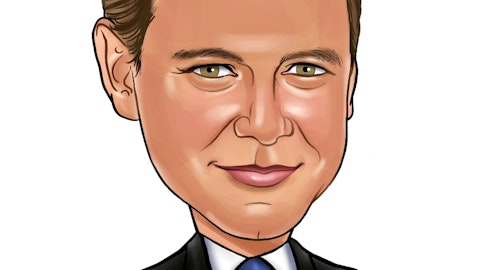David Meeker : Yes. I think we’re not updating those numbers that we stuck with it from the beginning. I think they are informative and they’re the right number. As we said, tens of patients on treatment was our expectation. We have tens of patients on treatment. We’re not going to speak to that number specifically. And the reason, Michael, basically, is it doesn’t inform BBS launch. They’re quite different in terms of disease populations and the different metrics or circumstances, if you will, that allow a BBS patients to come to diagnosis and get access to treatment aside from the fact that it’s just a larger population overall as well. So that’s progressing. We have, like I said, the tens of patients, but the focus here is really on the BBS launch and how that’s different from the other.
Other than the reimbursement part of it, reimbursement, of course, that earlier population has been helpful and somewhat predictive of how things are going to go for BBS. And as Jennifer said, we feel good about that.
Michael Higgins: Appreciate that. One other one, if I could hear. The HO trial that’s continuing on in the long-term extension. We have some patients at a 25-week point. Do you know when we may see an update on those and at later time points.
David Meeker: Yes. I mean, we’ll obviously continue to follow these patients. So again, I can imagine that the subsequent earnings call, a little bit depends on sort of when we do data cuts on that, and we don’t do data cuts weekly, obviously. So in fact, we try to time them about twice a year. So bottom line is, yes, we will update. It will be in 2023. We’ll work to keep you informed, but we are going to be following that closely.
Operator: Our next question is from the line of Jeff Hung from Morgan Stanley.
Unidentified Analyst: This is Catherine on for Jeff, thank you for taking our question. We have two. The first one is on the de novo study you’re starting in 2023. Could you remind us of the study design and what you’re hoping to see from the trial? And then our second question is on the Phase III in hypothalamic obesity, do you mind providing additional color on the rationale for all patients starting at 0.5 milligrams when in Phase II, they started on 1 or 2 milligrams…
David Meeker : Yes. Yes. So the de NOVA trial is a double-blind randomized controlled trial in patients predominantly with BBS. We will have a small number of patients with PPL since we’ll be with POMC and LEPR specifically since we’ll also be looking at the effect of the weekly dose in that population. And we’ll be looking at the two major primary endpoints we pursued all along, which is the change in BMI. Again, that will be a population that will span children and adults. So again, BMI is the uniting endpoint, if you will, that allows us to at least aggregate that to a certain degree and then hyperphagia. And I’ll just say on the hyperphagia point, again, this is something that as we come to understand this population and disease more thoroughly, the hyperphagia component continues to be reinforced.
And I think it is growing in awareness on the health care provider side of the equation. I think patients are articulating it more of the quotes that Jennifer shared with you today. They weren’t cherry picked. I mean those are quotes. There are just many of those quotes. And like I said, the vast majority of them speak to some level of improvement in their hunger and that being an important part of what how they’re benefiting from the drug. So we’ll be looking at that in that trial as well. On the Phase III trial in terms of the dosing, that was just a practical thing. We’ve been still experimenting a little bit with different titration regimens in the POMC, LEPR. We started lower and went slower. In the Bardet-Biedl we were more aggressive, if you will.




